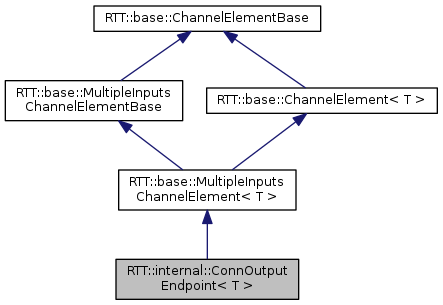#include <ConnOutputEndPoint.hpp>

Public Types | |
| typedef base::MultipleInputsChannelElement< T > | Base |
| typedef boost::intrusive_ptr< ConnOutputEndpoint< T > > | shared_ptr |
 Public Types inherited from RTT::base::MultipleInputsChannelElement< T > Public Types inherited from RTT::base::MultipleInputsChannelElement< T > | |
| typedef ChannelElement< T >::param_t | param_t |
| typedef ChannelElement< T >::reference_t | reference_t |
| typedef boost::intrusive_ptr< MultipleInputsChannelElement< T > > | shared_ptr |
| typedef ChannelElement< T >::value_t | value_t |
 Public Types inherited from RTT::base::MultipleInputsChannelElementBase Public Types inherited from RTT::base::MultipleInputsChannelElementBase | |
| typedef std::list< ChannelElementBase::shared_ptr > | Inputs |
| typedef boost::intrusive_ptr< MultipleInputsChannelElementBase > | shared_ptr |
 Public Types inherited from RTT::base::ChannelElementBase Public Types inherited from RTT::base::ChannelElementBase | |
| typedef boost::intrusive_ptr< ChannelElementBase > | shared_ptr |
 Public Types inherited from RTT::base::ChannelElement< T > Public Types inherited from RTT::base::ChannelElement< T > | |
| typedef boost::call_traits< T >::param_type | param_t |
| typedef boost::call_traits< T >::reference | reference_t |
| typedef boost::intrusive_ptr< ChannelElement< T > > | shared_ptr |
| typedef T | value_t |
Private Attributes | |
| InputPort< T > * | port |
Detailed Description
template<typename T>
class RTT::internal::ConnOutputEndpoint< T >
This is a channel element that represents the output endpoint of a connection, i.e. the part that is connected to the InputPort. In the RTT, connections are always created from input towards output. So this class is typically first created of the channel element chain and attached to the input port. Then we build further towards the outputport. Imagine a spider attaching a thread at one wall and moving along to the other side of the wall.
Definition at line 58 of file ConnOutputEndPoint.hpp.
Member Typedef Documentation
| typedef base::MultipleInputsChannelElement<T> RTT::internal::ConnOutputEndpoint< T >::Base |
Definition at line 64 of file ConnOutputEndPoint.hpp.
| typedef boost::intrusive_ptr<ConnOutputEndpoint<T> > RTT::internal::ConnOutputEndpoint< T >::shared_ptr |
Definition at line 65 of file ConnOutputEndPoint.hpp.
Constructor & Destructor Documentation
|
inline |
Creates the connection end that represents the output and attach it to the input.
- Parameters
-
port The start point. output_id Each connection must be identified by an ID that represents the other end. This id is passed to the input port port.
- Returns
Definition at line 75 of file ConnOutputEndPoint.hpp.
|
inline |
Definition at line 80 of file ConnOutputEndPoint.hpp.
Member Function Documentation
|
inlinevirtual |
Call this to indicate that a connection leading to this port is ready to use. The input port will check its channel elements by sending an inputReady() message. If this succeeds, this function returns true and the input port is ready to use (this->connected() == true). If sending inputReady() returns failure, this method returns false and the connection is aborted (this->connected() == false).
Reimplemented from RTT::base::ChannelElementBase.
Definition at line 92 of file ConnOutputEndPoint.hpp.
|
inlinevirtual |
Overridden implementation of ChannelElementBase::disconnect(forward, channel).
Reimplemented from RTT::base::MultipleInputsChannelElementBase.
Definition at line 130 of file ConnOutputEndPoint.hpp.
|
inlinevirtual |
Returns the class name of this element. This is primary useful for special case handling in the connection tracking.
- Returns
- The name of the class of the ChannelElement
Reimplemented from RTT::base::ChannelElementBase.
Definition at line 194 of file ConnOutputEndPoint.hpp.
|
inlinevirtual |
Returns the last output channel element of this connection. Will return the channel element the furthest away from the output port, or this if none.
- Returns
- getOutput() ? getOutput()->getOutputEndPoint() : this
Reimplemented from RTT::base::ChannelElementBase.
Definition at line 174 of file ConnOutputEndPoint.hpp.
|
inlinevirtual |
Gets the port this channel element is connected to.
- Returns
- null if no port is connected to this element, the port (or a proxy representing the port) otherwise.
Reimplemented from RTT::base::ChannelElementBase.
Definition at line 170 of file ConnOutputEndPoint.hpp.
|
inline |
Definition at line 184 of file ConnOutputEndPoint.hpp.
|
inlinevirtual |
Definition at line 179 of file ConnOutputEndPoint.hpp.
|
inlinevirtual |
Signals that there is new data available on this channel By default, the channel element forwards the call to its output
- Returns
- false if an error occured that requires the channel to be invalidated. In no ways it indicates that the sample has been received by the other side of the channel.
Reimplemented from RTT::base::ChannelElementBase.
Definition at line 157 of file ConnOutputEndPoint.hpp.
|
inlinevirtual |
Writes a new sample on this connection This should only be called if this endpoint has a buffer output, in which case the base class's write implementation will return true and the port is signalled. Otherwise, return false, as other type of connections are supposed to have a data storage element.
Reimplemented from RTT::base::ChannelElement< T >.
Definition at line 111 of file ConnOutputEndPoint.hpp.
Member Data Documentation
|
private |
Definition at line 61 of file ConnOutputEndPoint.hpp.
The documentation for this class was generated from the following file: